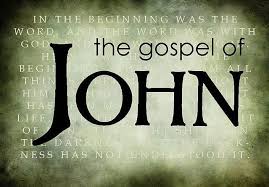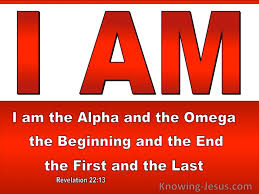Gospel of John

Three Gospel Themes from Johns Gospel
(Christology, The New Birth, and the Holy Spirit)
The Deity of Christ- Christology
John 1 1 In the beginning was the Word, and the Word was with God, and the Word was God. 2 He was with God in the beginning
14 The Word became flesh and made his dwelling among us. We have seen his glory, the glory of the one and only Son, who came from the Father, full of grace and truth.
Many scholars and religions call Jesus the son of God, but only Christianity declares Him to be God the Son.
When Moses appeared before God at the burning bush, he asked: 13 Then Moses said to God, “Indeed, when I come to the children of Israel and say to them, ‘The God of your fathers has sent me to you,’ and they say to me, ‘What is His name?’ what shall I say to them?”
14 And God said to Moses, “I AM WHO I AM.” And He said, “Thus you shall say to the children of Israel, ‘I AM has sent me to you.’[1]

“Moses says: May I say who sent me? He asks for God’s name. The Israelites will want to know who has sent me, and God replies with a sentence, “Ehyeh asher ehyeh.” This is a first-person sentence that can be translated, “I am who I am,” or perhaps, “I will be who I will be,” or perhaps, “I cause to be what I cause to be.” We really don’t know, but it has something to do with “being.” So he asks who God is, God says, “I am who am I am” or “I will cause to be what I will cause to be.” So Moses, wisely enough, converts that into a third-person formula: okay, he will be who he will be, he is who he is, “Yahweh asher Yahweh.” God’s answer to the question of his name is this sentence, and Moses converts it from a first-person to a third-person sentence: he will be who he will be; he is who he is; he will cause to be, I think most people think now, what he will cause to be, and that sentence gets shortened to “Yahweh.”
John 8:58 Jesus said to them, “Most assuredly, I say to you, before Abraham was, I AM.”

This author believes this verse,is the strongest argument for the deity of Jesus given in John chapter 8, although William M. Wright IV argues persuasively for this conclusion from John 8:12-20[2]
“According to Sokolowski, the biblical understanding of God undergoes a shift with the Incarnation. Jesus appears within the context of Old Testament revelation and its understanding of God, but the reality of the Incarnation also modifies this theological context. Whereas the Old Testament understanding of the one God would seem to preclude any
possibility of the Creator being identified with a creature, in the Incarnation, Sokolowski writes, “God is revealed to be so transcendent that he can enter into his creation without suffering limitation in his divinity. His divinity is such that he can become man without ceasing to be God.”14 The reality of the Incarnation and the revelation of the God of Israel as Trinity “deepens” or is an “intensification” of the understanding of God revealed in the Old Testament.15A (p6 Wright)
The New Birth – our new life:

Though Gundry does not discuss this topic in any great depth, the Scriptures indeed do. One way to discover more about this important topic is to key into a Scripture search on the topic of the word: ‘Zoe – Definition[3]
If this author had to synthesize and personalize this definition, I would simply define it as: 1. The life of God or perhaps 2. Spiritual life imparted from God. Johns gospel is not the only gospel to use this word, in fact it occurs 135 times in the Bible:[4]
The blog author, in writing for Bibles for America, makes a clear distinction between the three Biblical Greek words for ‘life’ used throughout the Scripture and their distinction bears quoting here:
“1. Bios, in Luke 8:14: “…anxieties and riches and pleasures of this life.” This Greek word refers to the life of the physical body and is where we get the word biology. 2. Psuche, in Matt. 16:25: “For whoever wants to save his soul-life shall lose it.” The Greek word here refers to the psychological life of the human soul, that is, the mind, emotion, and will. It is where we get the word psychology. 3. Zoe, in John 1:4: “In Him was life, and the life was the light of men.” Here the Greek word refers to the uncreated, eternal life of God, the divine life uniquely possessed by God.”[5] Here is where many preachers may park and preach for some time, in fact ministries are named after this important Greek word, and this is the great emphasis of the New Covenant, that is receiving and walking out our born-again experience: When this author preaches the gospel, it is usually focused on this: “Each and every one of us have been created in the image of God. We are also spiriting, we have a soul, and we live in a body. Jesus did not come to make bad people good, or good people better, He came to make dead people ALIVE! Except a man be born-again, he cannot even see the kingdom of God. God loves you personally and wants you to know Him on His terms. Religion has always been man’s set of rules and regulations attempting to reach God, Jesus is God’s attempt to reach man. He died for you, not because He had to, but because He loves you. Yet, He did not create robots, each of us has a free will. The question He would have me ask you is this: Do you want Him to be your king? Do you want to go to heaven when you die, to be with Him? If you do, the Bible makes this promise to each of us, ‘If you shall confess with your mouth the Lord Jesus, and shall believe in your heart that God raised Him from the dead, you shall be saved. For with the heart man believes unto righteousness, and with the mouth confession is made unto salvation. Rom 10:9,10’ Johns gospel uses the word ‘Zoe’ more than any other book of the Bible. In fact, this is the word used in the most oft quoted Bible verse of all time: John 316 For God so loved the world that He gave His only begotten Son, that whoever believes in Him should not perish but have everlasting life (zoe): Again, we see this word used in John 10: 10 The thief does not come except to steal, and to kill, and to destroy. I have come that they may have life, (zoe) and that they may have it more abundantly. It has been the experience of this writer that much of religious instruction focusses upon ‘Psuche’, that is the soul and mind of people, instead of ‘zoe’ the life of God imparted to people. Hence, much of academia has become dry – while Jesus promises that those of us that experience Him, should become wells of living water (zoe) to our generation. John 4: 14 but whoever drinks of the water that I shall give him will never thirst. But the water that I shall give him will become in him a fountain of water springing up into everlasting life.” |
John 3: 3 Jesus replied, “Very truly I tell you, no one can see the kingdom of God unless they are born again. [a]”
4 “How can someone be born when they are old?” Nicodemus asked. “Surely they cannot enter a second time into their mother’s womb to be born!”
5 Jesus answered, “Very truly I tell you, no one can enter the kingdom of God unless they are born of water and the Spirit. 6 Flesh gives birth to flesh, but the Spirit[b] gives birth to spirit. 7 You should not be surprised at my saying, ‘You[c] must be born again.
While Johns gospel is not the only gospel to use the word ‘Zoe’ he emphasizes it far more than any of the other gospel writers, as would be expected in that he had the closest relationship with Jesus, hence perhaps better understood the heart of God’s message through Jesus, his intent, not merely His words and deeds.
Holy Spirit

14:26 But the Advocate, the Holy Spirit, whom the Father will send in my name, will teach you all things and will remind you of everything I have said to you.
John 16: 12 “I have much more to say to you, more than you can now bear. 13 But when he, the Spirit of truth, comes, he will guide you into all the truth. He will not speak on his own; he will speak only what he hears, and he will tell you what is yet to come. 14 He will glorify me because it is from me that he will receive what he will make known to you. 15 All that belongs to the Father is mine. That is why I said the Spirit will receive from me what he will make known to you.”
Thomas Tops, in His excellent academic discussion of the ‘paraclete’[6] “Past scholarly literature has interpreted the orientation of the teaching of
the Paraclete in the Fourth Gospel as either retrospective or prospective. First, I will argue that it is prospective, but that this does not imply that the Paraclete teaches things that have not yet been taught by Jesus. The Gospel text challenges us to conceive the teaching of the Paraclete as prospective, but also, as repeating Jesus’ teaching. A synthesis of the retrospective and prospective interpretation is thus required. Second, I will argue that this paradoxical synthesis can be obtained on the basis of Kierkegaard’s category of repetition.”
Tops compares these two verses in great detail. To be honest, I do not have Mr. Tops depth of understanding of the Greek text, nor the time to dig as deeply as he appears to have done in his work to fully academically develop and evaluate his arguments for the work of the Holy Spirit taught by Jesus in these two verses but it is proposed that there appear to be two schools of thought along these lines, that are as follows:
In the first school of thought, it is argued that the Holy Spirit takes no active teaching role in the life of a disciple, only acting as ‘One who reminds’ people of what Jesus has already taught and is recorded in Scripture.
The second school of thought states that Holy Spirit reveals deeper knowledge of Jesus teaching and provides revelation of Jesus as a disciple is able to bear it, yet does not add anything new to the completed teaching of Christ.

In a third interpretation of John 16: 14 He will glorify me because it is from me that he will receive what he will make known to you. That Holy Spirit continues to teach and reveal to each generation, the literal voice of Jesus to His people, that clearly only deepens their understanding of what Jesus has already said.
“Interpretation two: if one understands teaching and reminding as distinct
functions of the Paraclete in John 14:26, the prepositional phrase ἐν τῇ
ἀληθείᾳ πάσῃ/εἰς τὴν ἀλήθειαν πᾶσαν is interpreted as expressing the ‘place
to which’. The Paraclete will guide the disciples into the full truth, where they
are not yet. John 16:13c is then understood as parallel to 14:26aβ. The Paraclete
will reveal things (16:12a πολλά) that have not yet been revealed in/by Jesus.
According to 16:13f, he will declare the coming things (τὰ ἐρχόμενα), which
God and Jesus (will)13 communicate to him (cf. John 4:25; see also Isa 41:22-3,
44:7, 45:11). His teaching is thus not oriented to the past, but to the future.[7]
This is the viewpoint I endorse, that Holy Spirit is tremendously active in the lives of followers of Jesus, constantly speaking, reminding, revealing and directing individuals and organizations in both the established Scripture and as
For this reason, I will not be negligent to remind you always of these things, though you know and are established in the present truth.
Yet, John 16:13 declares Holy Spirit will show us things to come, giving us direction for not only our daily task, but also our future destiny. It is the glory of this future usefulness to Him that keeps this author persevering through the academic rigors of this course of academic study.
[1] Hayes, Christina. “I Am That I Am.” Wikipedia. Wikimedia Foundation, January 9, 2021. https://en.wikipedia.org/wiki/I_Am_that_I_Am.
[3] Thayer and Smith. “New Testament Greek Lexicon – King James Version.” biblestudytools.com. Theological Dictionary of the New Testament. Accessed February 7, 2021. https://www.biblestudytools.com/lexicons/greek/kjv/.
[4] Public. Strongs’s #2222: zoe – Greek/Hebrew Definitions – Bible Tools. Accessed February 7, 2021. https://www.bibletools.org/index.cfm/fuseaction/Lexicon.show/ID/G2222/zoe.htm.
[5] for America, Bibles. “Three Greek Words for Life in the New Testament and How They Apply to Us.” Bibles for America Blog, January 29, 2021. https://blog.biblesforamerica.org/greek-words-for-life/.
[6] Topps, Thomas. “The Orientation of the Teaching of the Paraclete in the Gospel of John: Retrospective or Prospective?” New Test. Stud. ( pp. 68-86). © Cambridge University Press, , 2019. Accessed EBSCO @ORU Jan 31,2021
[7] Topps, Thomas. “The Orientation of the Teaching of the Paraclete in the Gospel of John: Retrospective or Prospective?” New Test. Stud. (68-86), pp. 9-10. © Cambridge University Press, 2019.



